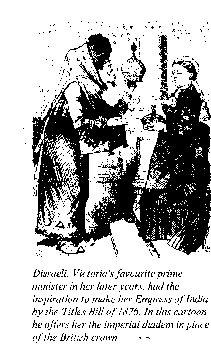
64
On the great issues which dominated British politics in the last quarter of the 19th century – the extension of
the Parliamentary franchise, the limitation of the Power of the House of Lords, social reform, Home Rule for
Ireland and the new aggressive imperialist policy abroad – Queen Victoria strongly sympathized with
Conservatives and disapproved of Gladstone and Liberals.
B. Disraeli became Prime Minister in 1868 and first held the office for only nine months, but he managed to
establish a very close relationship with the Queen and further developed it during his second term of office
(1874-1880). ┬. Disraeli pleased the Queen greatly by persuading Parliament to agree to grant her the title of
Emperess of India.
The contest of Disraeli and Gladstone was in full swing, and the two-party system had been already firmly
established.
Jingoism (the word for extreme, flag waving patriotism) was encouraged by B. Disraeli, but it was
condemned by his rival, the Liberal Leader, William Gladstone.
The Empire, that Great Britain had gained by the middle of the 19th century, was the result of the greatest
power that Britain possessed through its command of trade, finance and manufacturing. The colonies were
united by English law and by trade, the forms of governing administration varied. The whole population was
growing due to the emigration from the British Isles: throughout the 18th, 19th centuries poor and
disadvantaged people sought a new and a better life in the colonies. In 1850 New Zealand became the
responsibility of the Crown. The population of Australia was expanding rapidly. There were four self-
governing colonies: New South Wales, South of Australia, Victoria and Queensland. By the end of the century
the Empire was spreading over the continents of Africa, Asia, North America, South America, Australia. The
sun did not set on the Empire. The colonial office became a large and important ministry. Imperialism had
become popular with the middle classes. The patriots of jingoism sounded more and more aggressive: Cecil
Rhodes (the founder of
Rhodesia) spoke about the British as a race superior to their colonials. The actions of
the imperialists were no less dishonourable: a chain of "small colonial wars" was caused by the aggression of
the British imperialism. But the Anglo-Boer War proved to be an unsuccessful surprise to
the British people
and the proof of a certain weekness of the Empire (1880-1881, 1899-1902).
There was the Irish Problem: the Irish MP's in Parliament demanded Home Rule for Ireland, and Irish
extremists committed terrorist actions. Gladstone supported the idea of Home Rule for Ireland – which meant
the restoration of the Parliament, that they had lost by the Union with England in 1801 and the control of the
Irish local internal affairs. Gladstone's own Liberal Party voted against the Home Rule Bill. The Liberal Party
was split and broken. It's role as one of the two major parties in the country was over. The Liberals were to be
replaced by the forthcoming Labour Party in the constant struggle against the conservatives.
Due to the Industrial Revolution and the strength of the Empire Great Britain was still the greatest power of
the world in the last 30 years of the 19th century. Symbolic of its greatness and the expansion of the Empire
were the jubilees of Queen Victoria (1887 and 1897), celebrated with great pageantry and enthusiasm of the

